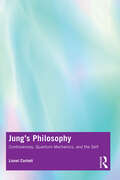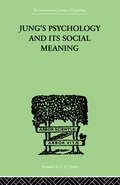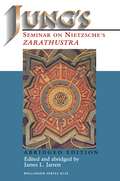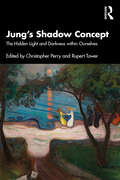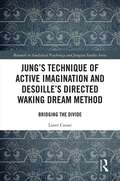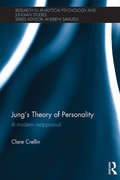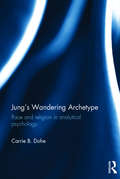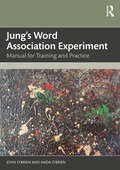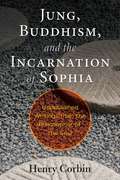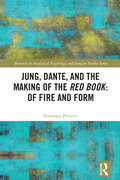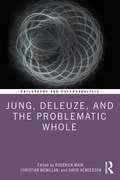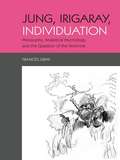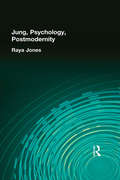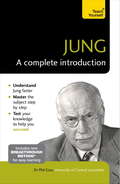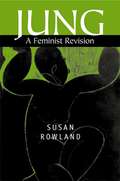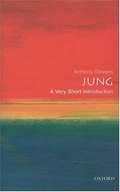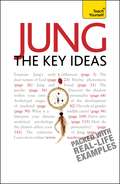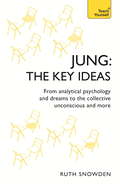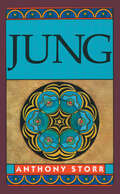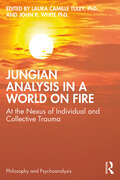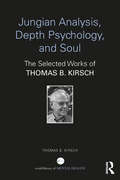- Table View
- List View
Jung's Philosophy: Controversies, Quantum Mechanics, and the Self
by Lionel Corbett‘Jung’s Philosophy’ explores some of the controversial philosophical ideas that are both explicit and implicit within Jung’s psychology, comparing the philosophical assumptions between this and other psychotherapeutic traditions. Within this book, Corbett provides a useful introduction to the philosophical issues relevant to the practice of analytical psychology, and how these are viewed by different psychotherapeutic traditions. Most of the disagreement between schools of psychotherapy, and much of the comparative literature, centres around differences in theory and technique. This book takes a different, more fundamental approach by comparing schools of thought based on their underlying philosophical commitments. The author discusses the philosophical basis of various worldviews such as idealism and realism, beliefs about the nature of the psyche and the unconscious, and the mind-brain relationship, and focuses on the way in which Jung’s psychology addresses these and related issues, including the possible relevance of quantum mechanics to depth psychology. This text will be of value to practising psychotherapists and Jungian analysts, individuals undertaking the relevant training, and students in depth psychology.
Jung's Psychology and its Social Meaning: An introductory statement of C G Jung's psychological theories and a first interpretation of their significance for the social sciences (International Library Of Psychology Ser.)
by Ira ProgoffRoutledge is now re-issuing this prestigious series of 204 volumes originally published between 1910 and 1965. The titles include works by key figures such asC.G. Jung, Sigmund Freud, Jean Piaget, Otto Rank, James Hillman, Erich Fromm, Karen Horney and Susan Isaacs. Each volume is available on its own, as part of a themed mini-set, or as part of a specially-priced 204-volume set. A brochure listing each title in the "International Library of Psychology" series is available upon request.
Jung's Seminar on Nietzsche's Zarathustra: Abridged Edition (Bollingen Series (General) #637)
by James L. JarrettNietzsche's infamous work Thus Spake Zarathustra is filled with a strange sense of religiosity that seems to run counter to the philosopher's usual polemics against religious faith. For some scholars, this book marks little but a mental decline in the great philosopher; for C. G. Jung, Zarathustra was an invaluable demonstration of the unconscious at work, one that illuminated both Nietzsche's psychology and spirituality and that of the modern world in general. The original two-volume edition of Jung's lively seminar on Nietzsche's Zarathustra has been an important source for specialists in depth psychology. This new abridged paperback edition allows interested readers to participate with Jung as he probes the underlying meaning of Nietzsche's great work.
Jung's Shadow Concept: The Hidden Light and Darkness within Ourselves
by Christopher Perry Rupert TowerThis insightful volume is designed as a series of invitations towards living attentiveness, examining how we all make the “other”, through “projection” (blaming and shaming the other outside ourselves), our enemy with whom we prefer not to dialogue. All of us are faced daily with individual and collective manifestations of the Shadow – all that we fear, despise and makes us feel ashamed. Carl Jung’s concept of the Shadow, emerging as it did from his personal confrontation with the realms of his unconscious self, is one of the most important contributions he made to the understanding of humanity and to depth psychology, that realm where the focus is on unconscious processes. The contributors to this book reframe his concept in the context of contemporary Jungian thinking, exploring how the Shadow develops in an individual’s infancy and adolescence, and its culmination, where collective manifestations of the Shadow are addressed. The book offers a voyage through a series of fundamental Shadow concepts and themes including couples relationships, disease, organizations, Evil, fundamentalism, ecology and boundary violation before ending with a chapter designed to help us integrate the Shadow and hold contra-positions with patience and a tilt towards mutual understanding, rather than being locked in polarities. This fascinating new book will be of interest to the general public, Jungian analysts, scholars and therapists both in training and practice with an interest in the inner world.
Jung's Technique of Active Imagination and Desoille's Directed Waking Dream Method: Bridging the Divide (Research in Analytical Psychology and Jungian Studies)
by Laner CassarJung's Technique of Active Imagination and Desoille's Directed Waking Dream Method brings together Carl Jung’s active imagination and Robert Desoille’s "rêve éveillé dirigé/directed waking dream" method (RED). It studies the historical development of these approaches in Central Europe in the first half of the 20th century and explores their theoretical similarities and differences, proposing an integrated framework of clinical practice. The book aims to study the wider European context of the 1900s which influenced the development of both Jung’s and Desoille’s methods. This work compares the spatial metaphors of interiority used by both Jung and Desoille to describe the traditional concept of inner psychic space in the waking dreams of Jung’s active imagination and Desoille’s RED. It also attempts a broader theoretical comparison between the procedural aspects of both RED and active imagination by identifying commonalities and divergences between the two approaches. This book is a unique contribution to analytical psychology and will be of great interest for academics, researchers and post-graduate students interested in the use of imagination and mental imagery in analysis, psychotherapy and counselling. The book’s historical focus will be of particular relevance to Jungian and Desoillian scholars since it is the first of its kind to trace the connections between the two schools and it gives a detailed account of Desoille’s early life and his first written works.
Jung's Theory of Personality: A modern reappraisal (Research In Analytical Psychology And Jungian Studies)
by Clare CrellinThis book provides a re-appraisal of Carl Jung�s work as a personality theorist. It offers a detailed consideration of Jung�s work and theory in order to demystify some of the ideas that psychologists have found most difficult, such as Jung�s religious and alchemical writings. The book shows why these two elements of his theory are integral to his
Jung's Wandering Archetype: Race and religion in analytical psychology
by Carrie B. DoheIs the Germanic god Wotan (Odin) really an archaic archetype of the Spirit? Was the Third Reich at first a collective individuation process? After Friedrich Nietzsche heralded the "death of God," might the divine have been reborn as a collective form of self-redemption on German soil and in the Germanic soul? In Jung’s Wandering Archetype Carrie Dohe presents a study of Jung’s writings on Germanic psychology from 1912 onwards, exploring the links between his views on religion and race and providing his perspective on the answers to these questions. Dohe demonstrates how Jung’s view of Wotan as an archetype of the collective Germanic psyche was created from a combination of an ancient discourse on the Germanic barbarian and modern theories of primitive religion, and how he further employed völkisch ideology and various colonialist discourses to contrast hypothesized Germanic, Jewish and ‘primitive’ psychologies. He saw Germanic psychology as dangerous yet vital, promising rebirth and rejuvenation, and compared Wotan to the Pentecostal Spirit, suggesting that the Germanic psyche contained the necessary tension to birth a new collective psycho-spiritual attitude. In racializing his religiously-inflected psychological theory, Jung combined religious and scientific discourses in a particularly seductive way, masterfully weaving together the objective language of science with the eternal language of myth. Dohe concludes the book by examining the use of these ideas in modern Germanic religion, in which members claim that religion is a matter of race. This in-depth study of Jung’s views on psychology, race and spirituality will be fascinating reading for all academics and students of Jungian and post-Jungian studies, religious studies and the history of religion.
Jung's Word Association Experiment: Manual for Training and Practice
by John O'Brien Nada O'BrienThis manual is the long-awaited definitive and essential guide to training, research and practice of Jung’s Word Association Experiment, both in clinical practice and beyond the consulting room. Carefully redesigned by training analysts, examiners, and researchers at the C. G. Jung Institute Zurich in consultation with a multi-disciplinary group of international authorities, this manual will enable multi-disciplinary practice and discourse while supporting a research/practitioner model. WAE grabs the spotlight as a therapeutic instrument remodelled to deliver measurable patient benefit. Bridging the worlds of empirical science and the depths of the human psyche, this book provides a platform for research into psychotherapeutic effectiveness and efficacy. The incorporation of Jung’s mature reflections, and of contemporary research, teaching and practice provides solid new insights to support established and innovative practice as well as further scientific research. This is a valuable new resource written for students and for the continuing professional development of analysts, academics and fellow professionals.
Jung, Buddhism, and the Incarnation of Sophia: Unpublished Writings from the Philosopher of the Soul
by Henry CorbinExamines the work of Carl Jung in relation to Eastern religion, the wisdom teachings of the Sophia, Sufi mysticism, and visionary spirituality • Reveals the spiritual values underlying the psychoanalytic theories of Carl Jung • Explores the role of the Gnostic Sophia with respect to Jung’s most controversial essay, “Answer to Job” • Presents new revelations about Sufi mysticism and its relationship to esoteric Buddhist practices • Shows how the underlying spiritual traditions of Islam, Judaism, and Christianity mesh with the spiritual teachings of Buddhism Henry Corbin (1903-1978) was one of the most important French philosophers and orientalists of the 20th century. In this collection of previously unpublished writings, Corbin examines the work of Carl Jung in relationship to the deep spiritual traditions of Eastern religion, the esoteric wisdom teachings of Sophia, the transformational symbolism of alchemy, and Sufi mysticism. Looking at the many methods of inner exploration in the East, including the path of the Sufi and Taoist alchemy, Corbin reveals how the modern Western world does not have its own equivalent except in psychotherapy. Expanding Jung’s findings in light of his own studies of Gnostic and esoteric Islamic traditions, he offers a unique insight into the spiritual values underlying Jung’s psychoanalytic theories. Corbin analyzes Jung’s works on Buddhism, providing his own understanding of the tradition and its relationship to Sufi mysticism, and explores the role of the Gnostic Sophia with respect to Jung’s most controversial essay, “Answer to Job.” He also studies the rapport between the Gnostic wisdom of Sophia and Buddhist teachings as well as examining Sophia through the lens of Jewish mysticism. Explaining how Islamic fundamentalists have turned their back on the mystic traditions of Sufism, Corbin reveals how totalitarianism of all kinds threatens the transformative power of the imagination and the transcendent reality of the individual soul. He shows how the underlying spiritual traditions of Islam, Judaism, and Christianity mesh with the spiritual teachings of Buddhism and reinforce the unity of the esoteric teachings of the world’s great religions. Comparing the imaginal realm with Jung’s archetypal field, he shows how we could transform the world by spiritualizing Jung’s methods, enabling us to transcend duality and make the created world divine.
Jung, Dante, and the Making of the Red Book: Of Fire and Form (Research in Analytical Psychology and Jungian Studies)
by Tommaso PrivieroThis book explores the genesis of the Red Book (or Liber Novus), through the lens of Jung’s lifelong confrontation with Dante and, in doing so, provides the first-ever thorough comparative analysis of the intertextual and symbolical correspondences between Liber Novus and the Commedia. Starting from Jung’s multifaceted fascination with Dante and his pivotal role in the former’s visionary material at historical, hermeneutical, and psychological levels, the book challengingly envisions Liber Novus as Jung’s Divine Comedy. This work finds a new way of approaching Jung’s understanding of concepts such as "visionary works" and "visionary mind" and considers how this approach can enhance our vision of depth psychology. Through various thematics such as the metanoia and the symbolism of animals, as well as the transformative role of the feminine and the erotic and spiritual imagery of the soul, this work revolves around the Jung-Dante correlation. Offering an original perspective within the field of Jungian and Dante scholarship, this book will be of great interest to academics and postgraduate students studying in the areas of Jung, Dante, analytical psychology, depth psychology, hermeneutics and Western esoteric currents and practices. The book will also appeal to Jungian analysts and psychoanalysts more broadly.
Jung, Deleuze, and the Problematic Whole: Originality, Development and Progress (Philosophy and Psychoanalysis)
by Roderick MainThis book of expert essays explores the concept of the whole as it operates within the psychology of Jung, the philosophy of Deleuze, and selected areas of wider twentieth-century Western culture, which provided the context within which these two seminal thinkers worked. Addressing this topic from a variety of perspectives and disciplines and with an eye to contemporary social, political, and environmental crises, the contributors aim to clarify some of the epistemological and ethical issues surrounding attempts, such as those of Jung and Deleuze, to think in terms of the whole, whether the whole in question is a particular bounded system (such as an organism, person, society, or ecosystem) or, most broadly, reality as a whole. Jung, Deleuze, and the Problematic Whole will contribute to enhancing critical self-reflection among the many contemporary theorists and practitioners in whose work thinking in terms of the whole plays a significant role.
Jung, Irigaray, Individuation: Philosophy, Analytical Psychology, and the Question of the Feminine
by Frances GrayHow do philosophy and analytical psychology contribute to the mal-figuring of the feminine and women? Does Luce Irigaray's work represent the possibility of individuation for women, an escape from masculine projection and an affirming re-figuring of women? And what would individuation for women entail? This work postulates a novel and unique relationship between Carl Jung and Luce Irigaray. Its central argument, that an ontologically different feminine identity situated in women's embodiment, women's genealogy and a women's divine is possible, develops and re-figures Jung's notion of individuation in terms of an Irigarayan woman-centred politics. Individuation is re-thought as a politically charged issue centred around sex-gendered difference focussed on a critique of Jung's conception of the feminine. The book outlines Plato's conception of the feminine as disorder and argues that this conception is found in Jung's notion of the anima feminine. It then argues that Luce Irigaray's work challenges the notion of the feminine as disorder. Her mimetic adoption of this figuring of the feminine is a direct assault on what can be understood as a culturally dominant Western understanding. Luce Irigaray argues for a feminine divine which will model an ideal feminine just as the masculine divine models a masculine ideal. In making her claims, Luce Irigaray, the book argues, is expanding and elaborating Jung's idea of individuation. Jung, Irigaray, Individuation brings together philosophy, analytical psychology and psychoanalysis in suggesting that Luce Irigaray's conception of the feminine is a critical re-visioning of the open-ended possibilities for human being expressed in Jung's idea of individuation. This fresh insight will intrigue academics and analysts alike in its exploration of the different traditions from which Carl Jung and Luce Irigaray speak.
Jung, Psychology, Postmodernity
by Raya JonesJung, Psychology, Postmodernity explores points of confluence and, more often, contradictions between Jungian and postmodern ideas. Throughout the book Raya Jones examines how personal meaning emerges in human activity. Jung addressed this in terms of symbol formation, with particular attention to dreams, myths, art and other fantasy productions. Postmodern psychologists tend to address issues of meaning in terms of peoples self-understanding and identity construction, with a focus on self-positioning in actual conversation or on autobiographical narratives. Jones draws a line of critical comparison between postmodern psychology and Jung’s descriptions of the symbolic dimension, myth, and the structure of the psyche. The book culminates with an evaluation of Jung’s psychic energy concept, for which there is no direct counterpart in postmodern psychology. Jung, Psychology, Postmodernity is an original critique of two key moments in the history of psychology. It will be welcomed by Jungians, as well as psychotherapists, and students of psychology.
Jung: A Complete Introduction: Teach Yourself
by Phil GossJung: A Complete Introduction is designed to give you everything you need to succeed, all in one place. It covers the key areas that students are expected to be confident in, outlining the basics in clear, jargon-free English and providing added-value features like summaries of key books, and even lists of questions you might be asked in your seminar or exam.The book uses a structure that mirrors the way Jung is taught on many university and counselling courses. Chapters include individuation and the archetypal power of the unconscious, Jung's early life, Jung's early career and key influences, Freud and Jung, the self and ego, the dark side, anima and animus, archetypes, typology, Jungian analysis, working with dreams, active imagination, developmental approaches, application of Jungian analysis to mental health needs, and Jung's legacy in culture, spirituality and therapy.Jung employs the 'Breakthrough Method' to help you advance quickly at any subject, whether you're studying for an exam or just for your own interest. The Breakthrough Method is designed to overcome typical problems you'll face as learn new concepts and skills.- Problem: "I find it difficult to remember what I've read."; Solution: this book includes end-of-chapter summaries and questions to test your understanding.- Problem: "Lots of introductory books turn out to cover totally different topics than my course."; Solution: this book is written by a university lecturer who understands what students are expected to know.
Jung: A Feminist Revision
by Susan RowlandThis book is designed for the new reader of Jung, for all those engaged with feminism and for researchers. Two chapters sketch the man, his life with women, and then carefully introduce all his important ideas. C. G. Jung loved the feminine all his life. The feminine is the pivotal fulcrum of both his work and his psyche. Yet Jung was certainly not a feminist in the sense of promoting women's participation in the world. This book not only introduces Jung to those who have never before encountered his ideas; it applies the full range of feminist research to remedy the neglect.
Jung: A Very Short Introduction
by Anthony StevensThis is the most lucid and timely introduction to the thought of Carl Gustav Jung available to date. Though he was a prolific writer and an original thinker of vast erudition, Jung lacked a gift for clear exposition, and his ideas are less widely appreciated than they deserve to be. Now, in this extremely accessible introduction, Anthony Stevens--one of Britain's foremost Jungian analysts--clearly explains the basic concepts of Jungian psychology: the collective unconscious, complex, archetype, shadow, persona, anima, animus, and the individualization of the Self. A small masterpiece of insight and concision, this volume offers a clear portrait of one of the twentieth century's most important and controversial thinkers.
Jung: Bullet Guides
by Robert AndersonOpen this book and you will Understand analytical psychology Explore Jungian thought Grasp essential concepts Explore the psyche
Jung: Bullet Guides
by Robert AndersonOpen this book and you will Understand analytical psychology Explore Jungian thought Grasp essential concepts Explore the psyche
Jung: From analytical psychology and dreams to the collective unconscious and more (TY Philosophy)
by Ruth SnowdenJung - the Key Ideas will quickly familiarize you with the revolutionary thinking of this great man. It will teach you all the essential concepts, from the collective unconscious to archetypes in dreams. Expressing Jung's sometimes complex ideas in simple terms, and backed up with references to his own texts, this book gives you everything you need to know.NOT GOT MUCH TIME?One, five and ten-minute introductions to key principles to get you started.AUTHOR INSIGHTSLots of instant help with common problems and quick tips for success, based on the author's many years of experience.TEST YOURSELFTests in the book and online to keep track of your progress.EXTEND YOUR KNOWLEDGEExtra online articles at www.teachyourself.com to give you a richer understanding of Jung.FIVE THINGS TO REMEMBERQuick refreshers to help you remember the key facts.TRY THISInnovative exercises illustrate what you've learnt and how to use it.
Jung: From analytical psychology and dreams to the collective unconscious and more (TY Philosophy)
by Ruth SnowdenCARL JUNG MADE EASYJung - the Key Ideas is designed to quickly familiarize you with the revolutionary thinking of Carl Jung, the founder of analytical psychology. Explaining Jung's complex ideas in simple terms, and backing it up with references to his own texts, you will learn all the essential concepts, from the collective unconscious to archetypes in dreams. You will learn about Jung's upbringing and the development of his thinking. Discover his early work and influences and how they came to shape his ideological and spiritual development. The intricacies of Jung's complex systems of thought are discussed in a straightforward and jargon-free way with particular focus on his lifelong fascination with the spiritual, the numinous, the inner world and the self-realization of the unconscious. Jung's exploration of mythology, dreams, visions and fantasies, as well as his studies into the journey of the psyche, are all explained, making often complex theories easy to get to grips with and the book also looks at his legacy and how his work and ideas have shaped psychology with many therapists still trained in the Jungian method.
Jung: From analytical psychology and dreams to the collective unconscious and more (Teach Yourself Philosophy Ser.)
by Ruth SnowdenCARL JUNG MADE EASYJung - the Key Ideas is designed to quickly familiarize you with the revolutionary thinking of Carl Jung, the founder of analytical psychology. Explaining Jung's complex ideas in simple terms, and backing it up with references to his own texts, you will learn all the essential concepts, from the collective unconscious to archetypes in dreams. You will learn about Jung's upbringing and the development of his thinking. Discover his early work and influences and how they came to shape his ideological and spiritual development. The intricacies of Jung's complex systems of thought are discussed in a straightforward and jargon-free way with particular focus on his lifelong fascination with the spiritual, the numinous, the inner world and the self-realization of the unconscious. Jung's exploration of mythology, dreams, visions and fantasies, as well as his studies into the journey of the psyche, are all explained, making often complex theories easy to get to grips with and the book also looks at his legacy and how his work and ideas have shaped psychology with many therapists still trained in the Jungian method.
Jung: Selected And Introduced By Anthony Storr (Fontana Modern Masters Ser.)
by Anthony StorrCarl Gustav Jung first wanted to be an archaeologist. When family finances made this impossible, he pursued a medical degree from Basel University. Considering a specialization in surgery, he stumbled upon a psychiatry book--an event that changed the course of his life and ultimately the whole field of depth psychology.Anthony Storr looks at these and other telling facts about Jung's life in the opening chapter of this highly acclaimed book. Though fundamentally concerned with Jung's ideas, Storr's approach shows his conviction that in the realm of dynamic psychology it is impossible to separate ideas from the personality of the man in whom they occurred. His clear and concise review of the whole corpus of Jung's writings always keeps in sight the man behind the work, as each subsequent chapter concentrates on a particular Jungian concept, guiding the reader through the life and ideas of this great thinker.Storr investigates the major principles of analytical psychology, presenting such central concepts as the collective unconscious, the archetypes, the shadow, and the persona. He looks at Jung's religious turmoil and his inner need to reconcile the opposition between objectivity and subjectivity. He shows how his ideas follow a progression from the intellectual agitation that characterized the young psychologist to the advanced theories of balance and integration found in the mature man. Storr concludes his book with a look at psychotherapy, describing advances as well as problems involved in a practical consideration of Jungian techniques.Perhaps the most remarkable element of Jung is its illumination of complex concepts--concepts that had they been easily accessible in the original would have caused a wider appreciation of Jung's work. The clarity and order that Storr brings to light in Jung's psychology will come as a welcome surprise to those who have found him an obscure if provocative thinker. Storr's sensitive analysis makes the book compelling reading for everyone interested in Jung, and his clear exposition provides a superior introduction for newcomers, allowing the genius of Jung to appear for the widest possible audience.First published in 1973, this classic study is now available again. The Routledge edition includes a brief preface in which the author describes his previous work on Jung as well as his meeting with the great Swiss thinker.
Jung: Teach Yourself
by Phil GossJung: A Complete Introduction is designed to give you everything you need to succeed, all in one place. It covers the key areas that students are expected to be confident in, outlining the basics in clear, jargon-free English and providing added-value features like summaries of key books, and even lists of questions you might be asked in your seminar or exam. The book uses a structure that mirrors the way Jung is taught on many university and counselling courses. Chapters include individuation and the archetypal power of the unconscious, Jung's early life, Jung's early career and key influences, Freud and Jung, the self and ego, the dark side, anima and animus, archetypes, typology, Jungian analysis, working with dreams, active imagination, developmental approaches, application of Jungian analysis to mental health needs, and Jung's legacy in culture, spirituality and therapy. 'A lucid and refreshingly innovative introduction to the complex thought of C.G. Jung' Paul Bishop, William Jacks Chair of Modern Languages, University of Glasgow 'A gold mine of knowledge in this eminently readable book that transcends the constraints of a set formula' Ann Casement, Licensed Psychoanalyst and Fellow of the Royal Anthropological Institute 'Of the many introductions to Jung's work, I find this one not only the most comprehensive but, importantly, very readable for the non-Jungian... It succinctly maps the remarkable contribution of Jung's distinctive approach to a wide number of subjects, principally psychology, psychotherapy, philosophy and the human condition' Steve Mitchell, Dramatherapist / Director Pathfinder Studio; former Course Director of Dramatherapy, Roehampton Institute, London Jung employs the 'Breakthrough Method' to help you advance quickly at any subject, whether you're studing for an exam or just for your own interst. The Breakthrough Method is designed to overcome typical problems you'll face as learn new concepts and skills. - Problem: "I find it difficult to remember what I've read."; Solution: this book includes end-of-chapter summaries and questions to test your understanding. - Problem: "Lots of introductory books turn out to cover totally different topics than my course."; Solution: this book is written by a university lecturer who understands what students are expected to know.
Jungian Analysis in a World on Fire: At the Nexus of Individual and Collective Trauma (ISSN)
by John R. White Laura Camille TuleyThis volume of essays, all authored by practicing Jungian psychoanalysts, examines and illuminates ways of working with individual analytic and therapeutic clients in the context of powerful and current collective forces, in the United States and beyond.One of Carl Jung’s central achievements was his clear recognition that the psyche is a locus not only of individual and personal experiences but also of social, collective, and even cosmological experiences. This important insight on Jung’s part both opens broad vistas for psychoanalytic practice and poses potential challenges for the psychoanalytic practitioner attempting to understand and aid the individual client amidst the pressure of intense collective energies, especially amidst collective crises. Among the themes treated in this volume are principles of non-violence, environmental activism, feminism, ecological shifts due to the pandemic, the Chingada complex, mass shootings, industrial farming of animals, and death anxiety.Jungian Analysis in a World on Fire will be of interest to Jungian, psychoanalytic, and depth-oriented analysts and therapists engaged in how best to work with individual clients in a time of social, political, and environmental crisis. It will also be valuable for scholars interested in understanding the impact of contemporary, collective traumas on individual psychology.
Jungian Analysis, Depth Psychology, and Soul: The Selected Works of Thomas B. Kirsch (World Library of Mental Health)
by Thomas B. KirschThomas Kirsch is one of the foremost architects of the contemporary Jungian scene and has influenced the evolution and organization of analytical psychology worldwide. His works on the history of Jungian analysis and his memoir of a "Jungian life" have been widely appreciated and this book contains important examples of these interests. Gathered together in The Selected Works are Kirsch’s original and humane contributions to diverse areas, such as: training and the dynamics of analytical institutions; clinical themes in Jungian analysis and how these differ from what typically happens in psychoanalytic treatment; as well as a continuation of his remarkable work into the personalities and prejudices that characterize the profession of Jungian analysis. As Andrew Samuels observes in his foreword, "In these chapters, we see Tom’s humanity, generosity and flexibility". Given the multifarious dynamics of the training community, Kirsch accepts that things can sometimes go wrong, and he is open about his experiences in this regard. For Kirsch, rather than a simple question of psychologically damaged people becoming analysts, the figure of the "Wounded Healer" is always present in depth psychology. Kirsch is an exceptionally gifted communicator and several of these chapters stem from lectures and conference presentations. However, behind the appearance of informality emerges, not only a formidable intellect at work, but a warm and compassionate perspective on the human condition. The Selected Works will be of vital interest to analysts, therapists, trainees, academics, and students working in the areas of Jungian analysis and Jungian studies around the world.
